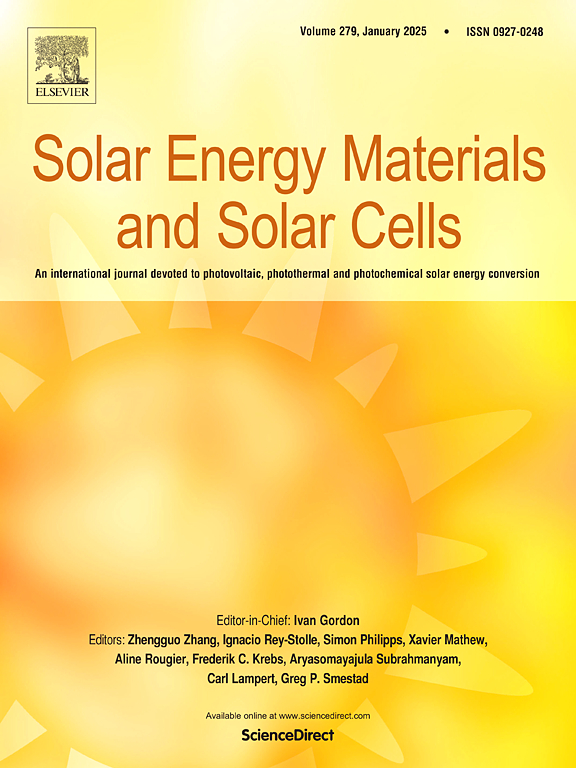Enhancing reactivity of Na2Zn(SO4)2 hydrates by doping for thermochemical energy storage
IF 6.3
2区 材料科学
Q2 ENERGY & FUELS
引用次数: 0
Abstract
The thermochemical properties of Na2Zn(SO4)2 are systematically analyzed under dynamic conditions at various partial vapor pressures ranging from 50 mbar to 700 mbar, aiming to evaluate its potential as a material for Thermochemical Energy Storage (TCES). At 50 mbar, dehydration to Na2Zn(SO4)2 starts at ∼94.5 °C and rehydration begins at 60.6 °C. At 700 mbar, onset temperatures shift to 105 °C for dehydration and 117.9 °C for hydration. Na2Zn(SO4)2 exhibits a favorable charging temperature interval and high cycle stability during the transition from dihydrate to anhydrate, indicating its promise for TCES applications. The introduction of dopants significantly influences system performance, resulting in: (a) a reduction in dehydration onset temperatures by 7–20 °C; (b) an increase in hydration onset temperatures by 3–7 °C; (c) complete vapor uptake reaching the stoichiometric 2 mol H2O/mol Na2Zn(SO4)2; and (d) shorter induction times with accelerated reaction kinetics. LiCl-doped samples also show improved stability and reduced mass loss over multiple hydration cycles. However, the complete hydration of tetrahydrate is not fully achieved, suggesting a need for further investigation into optimal dopant compositions and their effects on hydration kinetics. Overall, addressing thermodynamic challenges and optimizing hydration processes position Na2Zn(SO4)2·2H2O as a potential candidate for efficient and sustainable thermal energy storage, contributing to advancements in the field of TCES.
用热化学储能掺杂提高Na2Zn(SO4)2水合物的反应性
系统分析了Na2Zn(SO4)2在50mbar ~ 700mbar不同分蒸汽压下的动态条件下的热化学性质,旨在评估其作为热化学储能材料的潜力。在50毫巴时,脱水成Na2Zn(SO4)2开始于~ 94.5°C,再水合开始于60.6°C。在700毫巴时,脱水开始温度为105°C,水合开始温度为117.9°C。Na2Zn(SO4)2在从二水到无水的转变过程中表现出良好的充电温度间隔和高的循环稳定性,表明其在TCES中的应用前景。掺杂剂的引入显著影响系统性能,导致:(a)脱水起始温度降低7-20°C;(b)水化起始温度升高3-7℃;(c)完全吸汽量达到2 mol H2O/mol Na2Zn(SO4)2的化学计量量;(d)诱导时间缩短,反应动力学加快。在多个水化循环过程中,licl掺杂样品也表现出更高的稳定性和更低的质量损失。然而,四水化合物的完全水化并没有完全实现,这表明需要进一步研究最佳掺杂成分及其对水化动力学的影响。总的来说,解决热力学挑战和优化水化过程使Na2Zn(SO4)2·2H2O成为高效和可持续的热能储存的潜在候选物,有助于TCES领域的进步。
本文章由计算机程序翻译,如有差异,请以英文原文为准。
求助全文
约1分钟内获得全文
求助全文
来源期刊

Solar Energy Materials and Solar Cells
工程技术-材料科学:综合
CiteScore
12.60
自引率
11.60%
发文量
513
审稿时长
47 days
期刊介绍:
Solar Energy Materials & Solar Cells is intended as a vehicle for the dissemination of research results on materials science and technology related to photovoltaic, photothermal and photoelectrochemical solar energy conversion. Materials science is taken in the broadest possible sense and encompasses physics, chemistry, optics, materials fabrication and analysis for all types of materials.
 求助内容:
求助内容: 应助结果提醒方式:
应助结果提醒方式:


